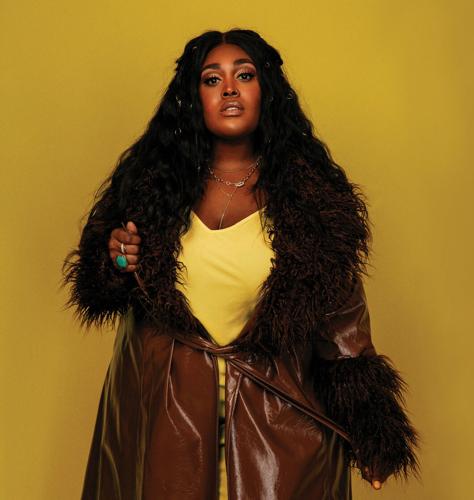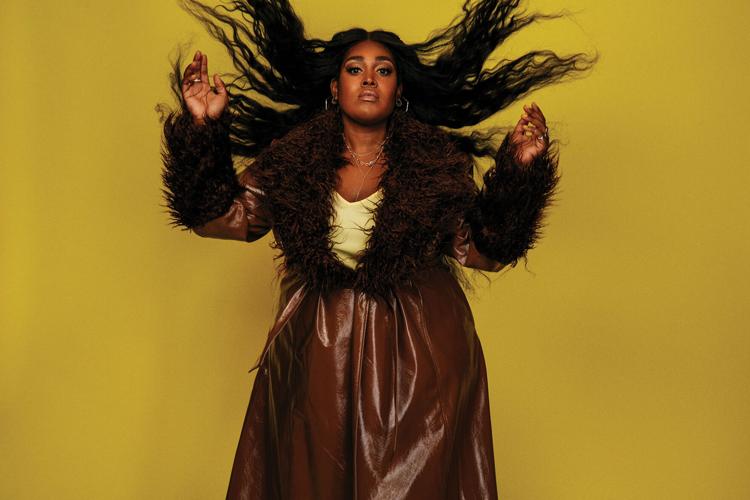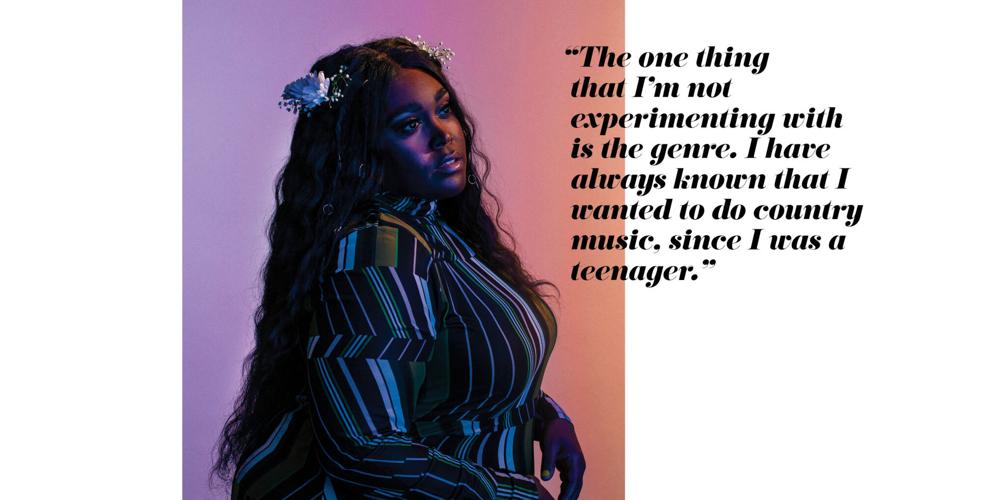
Brittney Spencer
On Thursday, Dec. 9, Brittney Spencer played a triumphant headlining show at The Basement East, one of the first dates on her In a Perfect World tour. The concert was something of a victory lap for the quickly rising country singer-songwriter, who grew up in Baltimore. Her 2020 EP Compassion and subsequent singles like “Sober and Skinny” have catapulted her from aspiring artist right onto the stage for the CMA Awards, her own solo tour and opening for Reba McEntire. The Scene linked up with Spencer before her Basement East show to talk touring, writing catchy melodies and country music’s issues with inclusion and representation.
It seems like 2021 has been a whirlwind of success for you, and now you’re headlining The Basement East in a few hours. How are you feeling going into the show?
It feels unreal, the last year-and-a-half of my life. I’m still trying to find ways to take it all in. And it’s pretty overwhelming to consider what the future looks like for me, in my artistry. For me, I find so much safety in staying in the present. I try to live in the moment as much as possible, because this is the only place where I can actually do something.
Willie Jones and Camille Parker are also on the bill tonight. What does it mean to you to have them join you for such a special show?
It means the world to me. They’re my really good friends. I love them. It’s really just like a family affair tonight. And I hope people feel that when they watch the show: It’s just friends who decided to do something together, and invite people to come and be a part, as well.
We love music. We love what’s been happening in country music. We love the new sounds that are really hitting country music hard right now. And we love that we get to be part of that. I’m not trying to make a statement at all. I just want to do stuff with my friends, my people.
Are you debuting new material?
Oh, yeah. I only have five songs out but I play for 75 minutes. I think the first time I realized, “Oh, whoa, you have to do more than five songs,” was when Jason Isbell asked me to open up for him at the Ryman. I found out my set was 45 minutes. And I’m like, “This man must really have faith in me, because I’ve only got a few songs out right now.” It’s been really cool, just building on the live show and building out something that I think will make sense for people and that people will hopefully enjoy, even though they don’t know all the songs. It’s been really fascinating, watching people still be intrigued and, hopefully, entertained during the show even though it’s mainly new songs. This is the fifth show tonight, and people are sticking around. Sometimes people even start singing the songs towards the end. And that’s a dream.
It must feel so validating to have people respond to your new material like that.
Yeah, and we are recording right now. A lot of the songs that are going so well and being so well-received [at live shows], we’re in the middle of recording. But even with that, I’ve just been experimenting. The one thing that I’m not experimenting with is the genre. I have always known that I wanted to do country music, since I was a teenager. So, I’m not experimenting with that. … I fuse different sounds together within the music that I perform and write.
And honestly, even just going on the road and deciding to do almost all new songs, that’s me experimenting. And I’m having a great time. I’m open. And I think people feel that, hopefully, in my personality and the music that I’m putting out and the shows I’m doing. I just want to do so many different things, and I want people to come along with me if they want to.
To your point about being a lifelong country fan, I’d love to hear more about what informed your sound. One of the first things that struck me about your music is your gift for writing melodies that are somehow both unexpected and familiar-feeling at the same time. What were some formative influences for your sense of melody?
I love a catchy hook. Like, love. I love how a lot of times in pop and R&B, the melody will catch you right away. But for me, lyric is king. That’s why I love country music so much. So fusing what I love so much about a catchy melody with a story that really brings the melody to life is so important for me. The lyric and the melody will go hand in hand, and if one is lacking, I just toss it out. If I can’t find the tune to make a section make sense, I let it go, because melody is just that important to me.
I grew up in church, and melodically, some of the older songs in church sound really similar. They’re melodies where you might not know all the words, but you catch on quickly. And there’s something so beautiful about that, where people just gravitate to a song because it’s easy to sing, because the melody just flows in a way that even a person who doesn’t know music at all understands that it makes sense. I say all the time that country and church [music] are so similar. That’s what drew me to country. I was just a kid in church and I heard The Chicks for the first time. I thought, “I love these melodies. I love the harmonies.” I just felt the commonalities in the music that I’d grown up on and country music, and it was beautiful. And I still do that to this day. I know some people don’t always like the fusion of pop and country, or using new technology in the studio, but I love it. I think it’s beautiful.
I’ve always thought it was interesting how country in particular is resistant to new ways of making music. There was a time when the guitar was a new piece of technology. When new tools are available to make music, and to make creating music more accessible than ever, why not use them?
Absolutely. This is a conversation I’ve had about so many other genres. “That’s not real hip-hop, that’s hip-pop,” or, “That’s rap, that’s not hip-hop,” or, “That’s not real R&B.” Pop is probably the one genre where people aren’t like, “That’s not pop,” because anything can be pop. Pop is just “popular,” right? Justin Timberlake, Adele and Olivia Rodrigo are all pop. But in every other genre you hear that conversation all the time. And we always have. So when I hear that conversation of, “What is country and what isn’t country,” it doesn’t really faze me, because everyone’s having that conversation about every genre. And it’s like, so what? Is it good? Is it telling the story? Is it honoring the traditions that made artists want to do this style of music in the first place? I just wish “good” was a genre.
You write with such vivid imagery and tell stories that don’t always go where a listener might expect. “Sober and Skinny” has an especially powerful lyric that already seems to have connected with a lot of people. What is the story behind that song? And how does it feel to know it’s reached so many fans?
I get overwhelmed with gratitude when people tell me that they like a song, or that it connects with them, or that they found a part of their story inside of this song. I can’t really explain this song. I’ve tried so many times, but when people ask me, I can’t really explain the song. It’s this open-ended story, and it’s not autobiographical at all, though some of my personal experiences helped inform the song. But it’s not something that I’ve actually experienced. I just wanted to write a story.
And that’s the beauty of storytelling for me. “Sober” and “skinny” are just metaphors. You can swap out those words for anything else that tells the story of a complex relationship. It’s not easy to be in love. It’s not easy to be in a relationship and to see a version of yourself that sometimes you might not like. When you are in a relationship, sometimes it feels like holding up a mirror to yourself, and you don’t always like what you see. And sometimes we project that on other people. With the people we love most, it’s easy to fixate on their issues and their flaws. And I’m really particular about how I talk about things like body image, because I think that when people are talking about body sizes or anything like that they’re rarely talking about health. And it’s such a complex thing. … So I was really careful about how I approached that subject matter. So it’s this nuanced song, and I think that’s why people have gravitated to it.
I also wanted to ask about the song “Compassion.” That and the Compassion EP seemed like a real breakout moment for you. Did you expect it to take off the way it did?
The song is just a walk in somebody else’s shoes. I wanted to take everyday, routine, mundane things and compare them against the really big circumstances that a lot of people face. So starting the song off with “a half-empty stomach makes you hangry, imagine life for people on the streets,” you know. We joke so much, or we just exaggerate, like, “Oh, I’m starving.” And we’re not actually starving. … When I put out the song, I didn’t think anyone would really listen to it. I just thought this EP would be something I could put out and I would be able to pitch it for some late-night slots or early-day slots at festivals. I didn’t think anyone would listen to this for a plethora of reasons. I mean, I know that song spoke to the times, but I wrote the song in 2018.
That makes sense — it’s not like the issues you sing about didn’t exist before 2020.
They didn’t suddenly become new. I wrote this song around May of 2018. We recorded the whole EP in November of 2019, so I wasn’t expecting all these events to happen. The idea was that we would record this project, and we’d take our time on post-production. We recorded all this stuff live — all the instrumentation, singing together, playing together, live in the studio in Knoxville, Tenn. The idea was that we would do post-production after November, and then the pandemic happened. So I slowed down everything. And I always knew I wanted to put out “Compassion” first. I said, “If anyone does listen to this, I want people to know, right off the bat, who I am and what I stand for.” I’ve always wanted to be that kind of artist.
I’ve watched other artists not do that in the beginning of their careers, and I get why. This isn’t a judgment or comparison at all. But I’ve watched other artists not do that. And then they start doing it and their fan base acts like they’ve changed. … And I was like, “You know, this song really means a lot to me. I think this probably should go first.” … I submitted “Compassion” to a songwriting competition here in Nashville, and they scored it pretty low, like 5 or 6 out of 10. So I definitely thought Nashville would not like this, or anything that talked about something other than kindness. I did not want to write about kindness. I wanted to write about people who protest, because I’ve met some really kind racist people in my life. I’ve met some really kind misogynists. I don’t think kindness is the revolution.
Kindness has to be the gateway drug to bigger things, like compassion and real action.
Kindness is so important. But I don’t need anybody to be nice to me right now. I need systemic change.
What was it like to perform “Love My Hair” with Mickey Guyton at the CMA Awards, on the stage of what is one of Nashville country’s biggest institutions?
It was an absolute dream. I still cannot believe that Mickey asked Madeline Edwards and me to perform with her. She didn’t have to share her platform. She could have taken that moment for herself, and she decided to share it. And I will never get over that. It was just a beautiful moment, to be able to sing about something that is so specific to the Black experience. But it’s also a song that’s so specific to so many other experiences. Like any kid with curly hair who’s teased … to be able to share that kind of story on the CMA stage, and to expand the representation of the kind of stories that can be told in this space — it was beautiful, honestly.
We’re in the middle of serious conversations about diversity and inclusion in country music, and it does seem like there have been some genuine glimmers of hope recently. Given that you’ve recently found yourself part of the mainstream country ecosystem, what is your take on what still needs to be done?
I think the CMAs having a song like “Love My Hair” be performed on the stage during “country music’s biggest night” is very telling of where we are and where the industry wants to go. I think that there are changes being made. I think that this space is becoming more inclusive. I think that it needs to continue to go in that direction.
I do see a lot of the tweets of people saying that not enough is being done. I get it. And I agree. But I also enjoy that this conversation is not a trendy one. It’s been going on for, like, a year-and-a-half, at least. We need to keep putting the pressure on. We need to keep putting the fire on. … I appreciate that this is a conversation, and that people are demanding more inclusion and more representation and more space to be made and more opportunities to be given. Because artists can’t do it on our own.
You’re just barely into your tour and have already talked about having some new material in the can, so what can we expect from you in the new year? Will there be an album?
There’s definitely lots of new music coming next year. This year I didn’t release a whole lot of music. I released “Sober and Skinny,” but I released two songs with Jason Isbell on his Georgia Blue record. Ashley Monroe and I did a duet that we released this year. I sang with The Highwomen for the Lady Gaga 10-year anniversary of Born This Way. But this year coming up, I really do want to put out more solo music as well. I’m looking forward to more collaborations. I’m looking forward to going on tour with Reba. In the meantime, I’m just just over-the-moon excited about getting these songs out to people.





